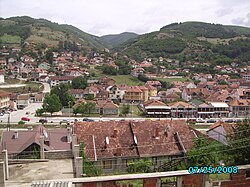Kačanik
| Kaçanik Kačanik |
|
|---|---|
| Municipality and city | |
| Kaçanik (Kaçaniku) Kačanik (Качаник) |
|
 |
|
| Location in Kosovo | |
| Coordinates: 42°13′N 21°15′E / 42.217°N 21.250°E | |
| Country | Kosovo |
| District | District of Ferizaj |
| Government | |
| • Mayor | Besim Ilazi PDK |
| Area | |
| • Total | 220 km2 (80 sq mi) |
| Elevation | 671 m (2,201 ft) |
| Population (2014) | |
| • Total | 34,000 |
| • Density | 150/km2 (400/sq mi) |
| Time zone | CET (UTC+1) |
| • Summer (DST) | CEST (UTC+2) |
| Postal code | 71000 |
| Area code(s) | +377 |
| Car plates | 05 |
| Climate | Cfb |
| Website | Municipality of Kaçanik |
Kaçanik or Kačanik (Albanian: Kaçanik or Kaçaniku; Serbian: Качаник, Kačanik, pronounced [kâtʃaniːk]) is a town and municipality in southern Kosovo, in the Ferizaj district. The municipality covers an area of 220 km2 (85 sq mi), including the town of Kaçanik and 31 villages. It has a population of approximately 33,454. With the exception of eight Roma and 30 Bosniaks, the municipality is ethnically homogeneous Albanian.
In March 2011 the pilot municipal unit of Elez Han was established within the Kaçanik municipality, holding approximately 10,000 out of the 33,454 total inhabitants.
The region of Kaçanik was one of the pathways, which were employed during Central European (akin to the Lusatian culture) migrations in the southern Balkans between 1200 and 1150 BCE. Roman era monuments include an altar that dates to 158–9 CE and is dedicated to a deity named Andinus (Deo Andino). The name Andinus appears among the central Illyrian and Dalmatian names, but the worship of Andinus seems to have been a local cult of southwestern Dardania as it doesn't appear in other parts of the Illyricum or the Roman Empire. In the Middle Ages.
Kaçanik was captured by the Ottomans in the 1420s. At that time Kaçanik was only a village registered by the Ottomans in 1455 defter as nahiyah.
Kaçanik was founded by Koca Sinan Pasha, who erected a tower, the town mosque which exists even today, a public kitchen for the poor (imaret), a school near the mosque, two hane (inns similar to caravanserais), one Turkish bath (hammam), the town fortress and a few mills on the Lepenac river. Koca Sinan Pasha, an Albanian, called the town Kaçaniku. A Kachak refers to an Albanian outlaw. As the Kaçanik area was used as a hideout for the Kachaks, Koca Sinan Pasha built the town fortress to keep out the Kachaks.
...
Wikipedia

